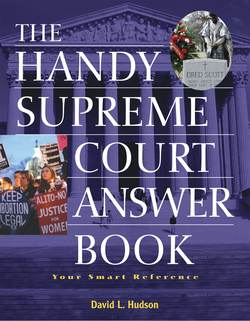Читать книгу The Handy Supreme Court Answer Book - David L Hudson - Страница 258
На сайте Литреса книга снята с продажи.
The Taney Court upheld the Fugitive Slave Act of 1793 in what decision?
ОглавлениеThe Taney Court unanimously ruled in Jones v. Van Zandt (1847) that the Fugitive Slave Act of 1793 was constitutional. John Van Zandt, an operator of the so-called Underground Railroad, was sued by Kentucky slaveowner Wharton Jones for harboring a male slave named Andrew. The Taney Court, in an opinion written by Justice Levi Woodbury, upheld the constitutionality of the law. The Court determined that slavery was a “political question settled by each State for itself.”
CourtSpeak: Jones v. Van Zandt (1847) Slavery Case
Justice Levi Woodbury (unanimous): “Before concluding, it may be expected by the defendant that some notice should be taken of the argument, urging on us a disregard of the constitution and the act of Congress in respect to this subject, on account of the supposed inexpediency and invalidity of all laws recognizing slavery or any right of property in man. But that is a political question, settled by each State for itself; and the federal power over it is limited and regulated by the people of the States in the constitution itself, as one of its sacred compromises, and which we possess no authority as a judicial body to modify or overrule. Whatever may be the theoretical opinions of any as to the expediency of some of those compromises, or of the right of property in persons which they recognize, this court has no alternative, while they exist, but to stand by the constitution and laws with fidelity to their duties and their oaths. Their path is a strait and narrow one, to go where that constitution and the laws lead, and not to break both, by travelling without or beyond them.”
